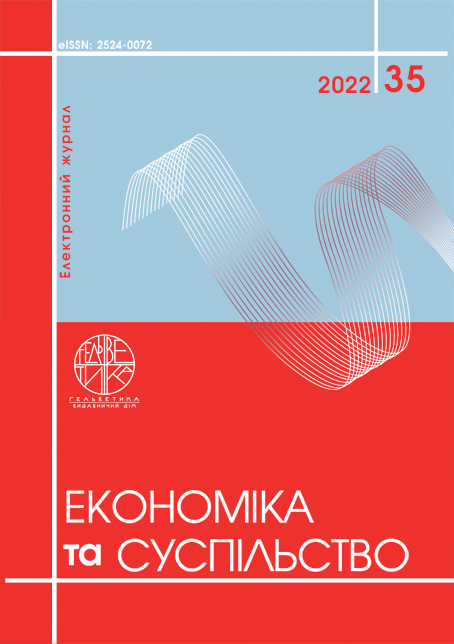SMART CITY CONCEPT AND IMPACT ON THE TOURISM IN THE DIGITAL ECONOMY
Abstract
The article examines the problems and prospects of tourism development, taking into account changes and new needs in the world economy caused by the pandemic, globalization and digitalization of the economy. The purpose of the study is to consider the prospects for implementing the Smart concept City and its impact on the development of the tourism industry. The authors emphasize that currently in the implementation of various management projects are increasingly resorting to consider the use of technologies related to the concept of Smart City . Tourism is one of the priority areas of economic and cultural development of the country and megacities of the world. Providing modern and completely new services of high quality, taking into account the security factor, requires new approaches to management urban environment and directly in the field of tourism. The authors determined that in order to actively apply the use of smart solutions by citizens, the city authorities need to study the experience of leading cities with similar characteristics. The authors defined a list of key factors and a number of objective factors that affect the popularity and ease of use of smart solutions in the tourist region. “ Smart city "- cities of the future, aimed at facilitating the daily routine of both citizens and public services, improving the environment, the introduction of advanced production and livelihood technologies, cities that meet all international standards and are fully ready to receive tourists, equipped with the necessary infrastructure all categories of citizens. The influence of smart cities on tourism in general is already noticeable. They seem to serve as an ideal model of a place of rest, just as the emergence of this concept has significantly increased the standards for facilities involved in the tourism process. It should be noted that smart technologies are used not only for general urban management, but also implemented in various sectors of the economy. The authors outline the main directions of smart technologies for the formation and development of innovative tourism product. Thus, it is possible to conclude that smart technologies are the basis of innovative solutions not only in integrated urban management, but also widely used for development, but also provide an opportunity to form and promote innovative tourism product of the city.
References
Buhalis D., Amaranggana A. Smart Tourism Destinations Enhancing Tourism Experience through Personalisation of Services. Information and Communication Technologies in Tourism 2015. ENTER 2015 Proceedings of the International Conference in Lugano. Switzerland : Springer International Publishing, 2015. P. 377–390.
Тонкошкур М.В., Рябєв А.А., Кравцова С.В. Управління розвитком сфер туризму і готельного господарства під час пандемії COVID-19. Бізнес Інформ. 2021. Вип. № 5.С. 215–221
Світлична В.Ю., Тонкошкур М.В., Кравцова С.В. Туризм під час пандемії: стан та перспективи розвитку. Інфраструктура ринку. 2020. Випуск 49.
Світлична В.Ю., Кравцова С.В. Подолання стагнаційних процесів підприємствами туріндустрії шляхом диверсифікації напрямів їх діяльності. Міжнародний науковий журнал «Інтернаука»: Серія: «Економічні науки». Київ, 2020. XІ (43) 2020.
Тонкошкур М.В. Кравцова С.В. Оцінка випливу окремих норм законодавства на практичну діяльність у сфері туризму. Науковий вісник Ужгородського національного університету. Серія Міжнародні економічні відносини та світове господарство. 2021. Вип. 35. С. 59–64.
Buhalis D., Amaranggana A. Smart Tourism Destinations Enhancing Tourism Experience through Personalisation of Services. Information and Communication Technologies in Tourism 2015. ENTER 2015 Proceedings of the International Conference in Lugano. Switzerland : Springer International Publishing, 2015. P. 377–390.
Tonkoshkur M., Ryabev A., Kravtsova S.V. (2021) Upravlinnja rozvytkom sfer turyzmu i ghoteljnogho ghospodarstva pid chas pandemiji COVID-19 [Administrating the Development of Tourism and Hospitality Industries During the COVID-19 Pandemic]. Biznes Inform, no 5, pp. 215–221.
Svitlychna V.Ju., Tonkoshkur M.V. Kravtsova S.V. (2020) Turyzm pid chas pandemiji: stan ta perspektyvy rozvytku [Тourism during a pandemic: the state and prospects of development]. Market infrastructure, no 49, pp. 213–218.
Svitlychna V.Ju., Kravtsova S.V. (2020) Podolannja staghnacijnykh procesiv pidpryjemstvamy turindustriji shljakhom dyversyfikaciji naprjamiv jikh dijaljnosti [Overcoming stagnation processes by tour enterprises by diversification of their directions of activity]. Interscience, no XІ (43).
Tonkoshkur M.V. Kravtsova S.V. (2021) Ocinka vyplyvu okremykh norm zakonodavstva na praktychnu dijaljnistj u sferi turyzmu [Аssessment of the influence of certain legislation regulations on practical activities in the field of tourism]. Scientific Bulletin of Uzhhorod National University, no 35, pp. 59–64.


